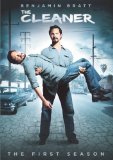| Reviews & Columns |
|
Reviews DVD TV on DVD Blu-ray 4K UHD International DVDs In Theaters Reviews by Studio Video Games Features Collector Series DVDs Easter Egg Database Interviews DVD Talk Radio Feature Articles Columns Anime Talk DVD Savant Horror DVDs The M.O.D. Squad Art House HD Talk Silent DVD
|
DVD Talk Forum |
|
|
| Resources |
|
DVD Price Search Customer Service #'s RCE Info Links |
|
Columns
|
|
|
Cleaner: The First Season, The
Your man Dr. King said, 'Faith is taking the first step even when you can't see the whole staircase.' I'm not sure we ever see the staircase. The faith here in L.A. is blind; it's the only town where you can actually die from encouragement."
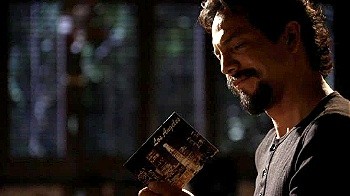
The Series
When his wife was giving birth to their second child, William Banks was in the hospital hallway slamming dope. It was one of many setbacks for the troubled man, who had already seen jail time for his drug problem. When he finally came to his senses, he made a deal with God: If the Mighty One helped him and his family get through the difficult time, William would become an "avenging angel" and dedicate his life to helping addicts clean up: "I'm a collector of lost souls." When we join him in the pilot episode of The Cleaner, the interventionist has already saved 257 people from addiction to drugs, sex and gambling. He's not a cop. He's not a superhero. He's just a man with a calling.
That's the driving force of this A&E drama, which feels like three other shows blended together. The obvious influence is A&E's own Intervention, the reality series that chronicles the struggles of real-life addicts and their families. There's also a little dash of Saving Grace, as William constantly talks to God in an effort to find answers to his daily struggles: "I put my trust in you, my faith, and I'm not even a religious man. This whole arrangement is based on my lack of religion...now where does that leave us? Am I supposed to continue doing your work?" (The Cleaner's theme song follows in Grace's county blues footsteps.)
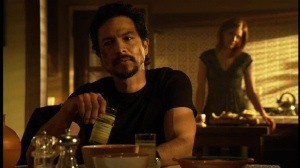

There's also a healthy does of Burn Notice (or insert your procedural of choice). William technically works at a surf/auto body shop, but the facility also serves as the headquarters for his team: a group of recovered addicts who help him solve "cases" as undercover freelance operatives. There's the rebellious Akari (Grace Park), a sexy smartass that William slept with while separated from his wife; eager-to-please Arnie Swenton (Esteban Powell), a jittery "half-assed rock star wannabe" (he says things like "This camera's hotter than Eva Mendez in Training Day...and that was full frontal!"); and newest member Darnell (Kevin Michael Richardson), a used car salesman and former gambler with a kind soul. They're like 21 Jump Street meets The A-Team (Addiction, that is) for a more jaded generation.
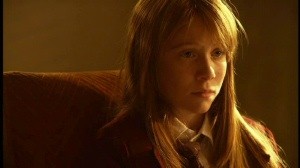
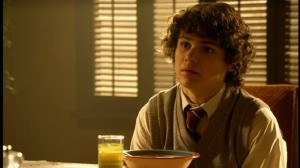
They get hired by the loved ones of addicts spiraling out of control. William doesn't mind bending the law, and does whatever it takes (lying, abducting, breaking and entering) to serve the greater good. His team digs up clues and dirt, assumes identities, works surveillance and waits for the right time to "grab" their targets and try to convince them to check into Transitions, the rehab facility of choice. The odds are against them--the addicts have a 75 percent relapse rate and a 25 percent mortality rate.
It's a tough job on two counts--it puts the band of do-gooders in constant contact with the temptations they fought so hard to conquer, a lure that starts to tempt former meth addict Swenton. It also leaves little time for any personal life, and no one knows that better than William--whose busy cell phone is a constant source of irritation for his neglected family. He and wife Melissa (Amy Price-Francis) sleep in separate bedrooms and constantly bicker ("All you did was replace one fix for another!"), which isn't helping the mental stability of son Ben (Brett DelBuono) and daughter Lula (Liliana Mumy). Their struggles at home provide the show's continuing thread, with individual cases filling out the rest of each episode.
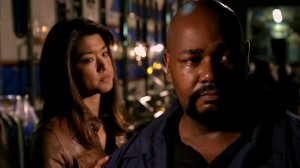
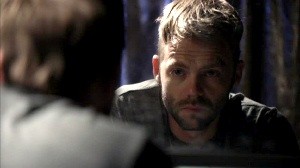
It's a heavy watch, and that's one of the biggest obstacles the show faces. The Cleaner swims in serious, somber waters, almost never coming up for air (there's very little humor here). But even worse--and what's painfully obvious--is that the show doesn't come close to having the emotional or entertainment impact of the three influences it draws from. While the cast (including all of the guest stars who you'll recognize from other television appearances, including Kathy Baker, Tate Donovan, Isaiah Washington, Patrick Fabian, Sarah Clarke, Rachel Miner, Anastasia Griffith, Tim DeKay and Kari Matchett) is accomplished and capable, the show is surprisingly hollow.
The production values are also very high (the show looks beautiful), maybe too high--the impression is more glossy, not raw. Having not faced addiction issues like those portrayed here, I can't speak to the show's authenticity, but I imagine a lot is glamorized or left out (which, in all fairness, is probably necessary for a TV show).
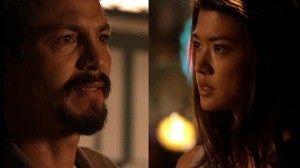
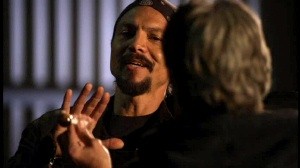
It's tough material to pull off, and The Cleaner doesn't quite have the depth and power required to make you care for these characters and feel their pain. The single-episode cases don't give us nearly enough time to acquaint ourselves with the guest roles; these people are in a terrible place from the start, and we have virtually no reason to invest much into their recovery. You develop a sense of sameness to all of their plights, and I became numb to much of the strung-out junkie acting and random spaz-outs employed by many of the actors: extreme anxiety, apprehension, distrust, paranoia, anger, violent outbursts...it all blends together, with no truly meaningful development.
The worst example of this comes in the finale, where a Temptations patient given virtually no back story or screen time is suddenly (and oddly) thrust upon us in a super-serious subplot (child in danger!) that has zero impact. That happens a lot this season--so many cases relying on flashy theatrics instead of heartfelt, complex characterizations and stories. There's an early development (don't get too close to Gil Bellows) that hints at having season-long effects on William, but it's dropped pretty quickly; it's a shame, because Mickey is one of the few characters that is able to break through and touch the audience.
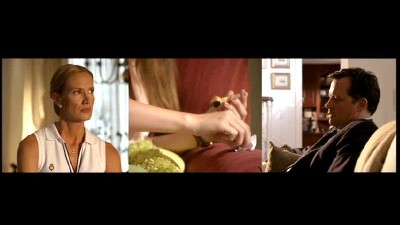
In many cases, the addict acting is too extreme, it becomes counterproductive to the writers' intent (I'm looking at you, Kelly Preston!). Some of the performances are too over-the-top, like the actors are aiming for an Emmy nod with the award-bait roles by resorting to overdone, exaggerated mannerisms (some just don't know when less is more). There are only so many breakdowns set to classical music or sad songs (please, no...not "Mad World"!) that viewers can take.
It gets old quickly, so when a bulimic stuffs food down her mouth or a yuppie mom screams "I just wanna be perfect!", it doesn't always work. The show tries too hard sometimes, and I rolled my eyes at some of the obvious manipulation (like a strung out teenager accepting his adorable little sister's money for drugs) that leaves little doubt The Cleaner is going for your jugular. Witness this exchange between a pawn shop owner and a desperate addict trying to get drug money by selling a wedding dress:
Owner: "50 bucks."
Woman: "50?! 50?!! This is Vera Wang...Vera Wang!"
Owner: "Never heard of her. 50 bucks."
Woman: "C'mon, man!"
The main players don't fare much better. Bratt does about as well as he can with the material, although he isn't fully convincing all the time (for me, he mishandles a confrontation with his son on the field in Episode 5). William doesn't always feel like a real person--he runs hot and cold. His words and actions are sometimes telegraphed to force dramatic tension: William unnecessarily butts heads with Ben over his son's desire to quit football, a conflict that is drawn out for far too long and makes little sense (ditto his desire to bring Ben to a baseball game).
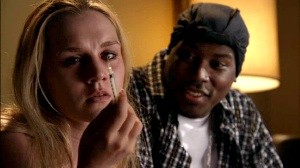
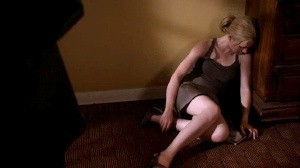
But a bigger misstep becomes obvious in the season finale, when he switches roles with Michelle. Her newfound, time-consuming career now has selfish William jealous of her time and her new boss (another painfully obvious subplot). His childish behavior is sometimes aggressively argumentative, and seems to be purposely magnified for the sole sake of providing revelatory growth later down the line.
As for Akani and Swenton, neither is very likable or complex--they bicker a lot, and Swenton's relapse storyline is mishandled in a few ways. His breakdown is riddled with clichés, including his "devil" persona berating him in a mirror and (no!) a cartoon playing on the television in the background (how loony!). Even worse, he's given no respect by his so-called friends: You're telling me two former addicts would be this oblivious and careless with his situation? (If these characters don't care that much for each other, how are we supposed to?)
Akani is particularly cold, nearly impossible to warm up to. Darnell is the only likeable member of the group, but he's given relatively little to do. We barely know anything real about them; outside of their recovery struggle, they're given little to use. That might account for why the four team actors sometimes feel like they're performing individually, not together--they just don't gel.
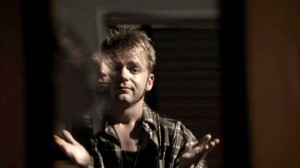
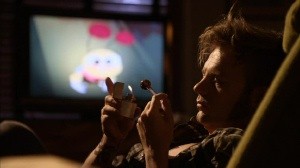
Back in the Banks' household, things aren't much better: Melissa is rightfully (and constantly) frustrated with William, which doesn't help endear them as a couple--we don't have much rooting interest in their success together, and it's near impossible to feel the few moments that are supposed to be tender. The show should have taken an episode to flesh out their history more, and it fumbles a big opportunity in a later episode--flashbacks to William's detox (interspersed with Swenton's current struggle) offer absolutely nothing unique or fresh.
As for the kids, Ben mopes around and hates football, while Lula is a perfectionist and wants to be a spelling champion--that's about all we're given. DelBuono is a little too one-note throughout the season, his monotone demeanor and delivery not nearly passionate enough to make us feel Ben's anger. Collectively, these just aren't people I enjoyed spending a lot of time with.
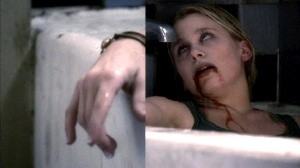
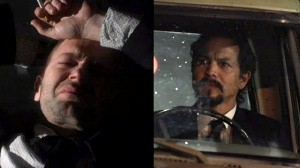
The faith angle also falls flat: William's conversations with God come across like convenient plot devices that try to force important "moments" and meaning, using generic musings that don't have much depth: "I get that everything happens for a reason, and I get the mysterious ways in which you move. But I wonder if moments like this cause even you to doubt, to question, us." We also get references to the "cosmic balance in the universe"; some "Why do bad things happen to good people?" moments ("What happened to the grace of God?"). The sequences lack the sincerity and thought-provoking plot integration that Saving Grace does so well.
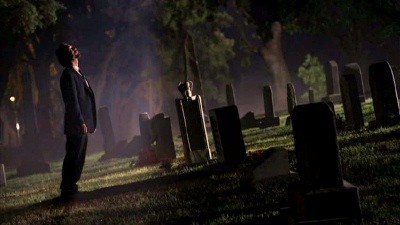
The show doesn't earn many style points, either--while visually strong, The Cleaner suffers from an over-reliance on split screens, a flashy device that's unnecessary (the tactic quickly loses its power). There's also an excessive amount of flashbacks and druggie montages from scenes in the same episode (!), as if viewers aren't smart enough to remember or "get" the power of a moment. And any time the show aims for a revelation or plot twist, it falls flat--there are no surprises here (half the time there's a shadowy figure, you know it's William).
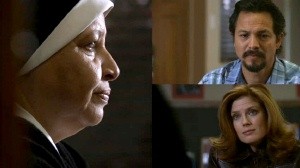

I don't want to dismiss the show completely. There is too much talent here to ignore, and there are far worse ways to spend 44 minutes. Some of the stronger episodes include "Here Comes the Boom", with Eric Roberts; "House of Pain", where a prep school student falls into a deeper depression after the death of a classmate; and "Back to One", where an actress aches for her big break. There are some moving moments that work, but as a whole it's an uneven collection. After a while, it's just too much. For every genuinely emotional moment, there are at least two that feel fake and manufactured. The finale is the worst episode of the season, and the end to the jockey-themed "Let it Ride" sinks even lower than I would have expected ("Some horses can't be tied down!").
Ultimately, The Cleaner feels empty. It never comes up for air and is in desperate need of some levity; the characters are more suffocating than inspiring, preventing any true enjoyment or enlightenment. The show isn't hard to watch because of its subject matter, it's hard to watch because it takes itself too seriously and neglects what's really important--some humanity and genuine feeling, which would pack a far more powerful punch.

Episode Guide
The 13 episodes are presented on 4 discs; all run about 44 minutes.
1. Pilot (aired 7/15/08) William banks, a recovering drug addict and interventionist, works hard to help others get clean while trying to maintain a normal life with his wife and kids. NOTE: The longer broadcast version of the pilot, which runs 7 minutes longer than the version presented on the main menu, must be accessed via the Special Features menu.
2. Rag Dolls (aired 7/22/08) After he buries his best friend, William tries to help a young female surfer who appears to be clean--but runs with a crowd of drug dealers.
3. Meet the Joneses (aired 7/29/08) As William grows more distant from his son Ben, he and his team are hired to infiltrate an elaborate drug club where suburban moms abuse prescription drugs.
4. Chaos Theory (aired 8/5/08) A brilliant mathematician is dancing on the edge, abusing cocaine in order to finish a paper. Meanwhile, Ben finds a syringe. Includes 10 deleted scenes (12:27).
5. Here Comes the Boom (aired 8/19/08) After his very first client dies, William promises to help her son, whose ex-con father rolls with a biker gang. Includes a collection of deleted scenes (5:42).
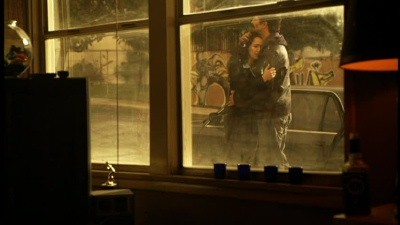
6. To Catch a Fed (aired 8/26/08) While his wife Melissa tries to bring home their son, William is blackmailed into helping an FBI agent, who claims to have evidence against team member Akani.
7. House of Pain (aired 9/2/08) When a prep school student overdoses, William and his team infiltrate her school, where they suspect a star basketball player may be addicted to heroin. Includes 3 deleted scenes (4:12).
8. Let it Ride (aired 9/9/08) The top jockey in the country has a drug habit, but everyone turns a blind eye in order to keep him racing.
9. The Eleventh Hour (aired 9/16/08) In order to save her sister, a woman hires William--but her mother hires William's competitor.


10. Rebecca (aired 9/23/08) A musical prodigy starts using in order to escape her mother's wrath. Meanwhile, Melissa flirts with real estate, while team member Swenton flirts with drugs.
11. Back to One (aired 9/30/08) A struggling actress who's had a taste of fame has an even stronger taste for cocaine. Melissa quits her job, and Swenton continues to spiral downward.
12. Five Little Words (aired 10/7/08) As William helps Swenton recover, he flashes back to his own detox. Team member Darnell resents helping a drug dealer with his bulimic daughter. Includes 3 deleted scenes (2:54).
13. Lie with Me (aired 10/14/08) Melissa is thrilled when she sells her first house, but it threatens her relationship with William. An alcoholic couple loses custody of their daughter. Includes 1 deleted scene (:59).
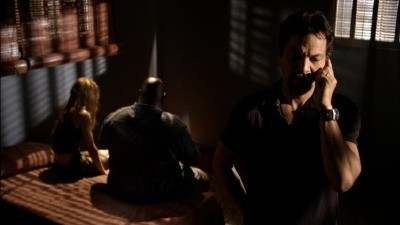
The DVD
Video:
The anamorphic widescreen transfer is excellent. While some dark and grainy shots pop up in the pilot and throughout the season, they're intentional. The quality becomes more apparent with each episode. This is often a visually dark show, but I was struck by the sharpness and detail on display, particularly with faces (especially skin and hair). The picture utilizes different tones at different times, from a warm orange at the Banks' house to cold and grey drug-induced efforts. Colors, when used, are vibrant and effective. Overall, an outstanding picture.
Audio:
The 5.1 track makes more use of rear channels than you would expect, and constantly keeps you aware of your surroundings, whether it's a busy crowd or a horseracing track. Dialogue is also crisp and clear. English Stereo and Spanish Stereo tracks are also provides, with subtitles coming in English, Spanish and Portuguese.
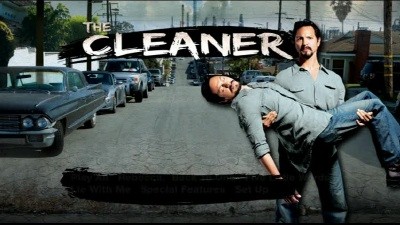
Extras:
What seems like a generous collection of extras--spread across four discs--proves to be disappointing. The best offering is two audio commentaries by co-creators Robert Munic and Jonathan Prince along with actor Benjamin Bratt. They chime in on two episodes: the extended version of the pilot and Episode 5, "Here Comes the Boom". I was a little disappointed that there wasn't much discussion about the influence of the series and its creation (which also isn't addressed anywhere else in the extras); we mostly get stories about the vast and crew, and various shots, with lots of talk about the show being a hybrid of procedural and "true"/family drama. The three bounce off each other well and have a lot of affection for the project and everyone involved, which is nice to hear. My favorite moment comes when Munic describes his first encounter with guest star Eric Roberts, and other moments make these nice listens for fans of the show.
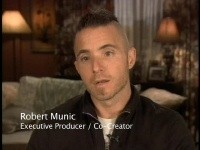


Also here are a collection of deleted scenes (in lower quality, non-anamorphic video; see Episode Guide above for more details); nothing too necessary here, although a few omissions in Episode 4 might have helped. The Mystery of William Banks (4:08) is like a commercial for our hero; it features the main cast--all in character--talking about William. More than anything, it just serves to highlight how out-of-place Swenton's character feels to me; it offers nothing of substance.
 Neither does On Set with Esteban Powell (14:30, full frame), a collection of video footage shot behind the scenes by the actor during the filming of a few episodes. He briefly interviews some guest stars, tries to master his motorcycle riding skills, gets fake tattoos and works on some loping in post-production. It's a snoozer, just like the PR fluff passed off as Cast and Crew Interviews (9:43, full frame). There's nothing interesting here, with everyone sharing obvious observations on the show and characters. It's also filled with two very long episode clips that eat up a lot of the running time.
Neither does On Set with Esteban Powell (14:30, full frame), a collection of video footage shot behind the scenes by the actor during the filming of a few episodes. He briefly interviews some guest stars, tries to master his motorcycle riding skills, gets fake tattoos and works on some loping in post-production. It's a snoozer, just like the PR fluff passed off as Cast and Crew Interviews (9:43, full frame). There's nothing interesting here, with everyone sharing obvious observations on the show and characters. It's also filled with two very long episode clips that eat up a lot of the running time.
The gag reel (3:00) is one of the least funny you'll see (only one mildly musing moment here, which involves Richardson and a prop). The International Promo (3:52) is like a commercial for the season, featuring clips from many episodes. Two music videos are also listed as extras: Sharon Little sings "Follow that Sound" (the show's theme song) from Episode 4, and Karmina sings "Walk you Home" (a far more emotional and moving tune) from Episode 7. But these aren't actually music videos--they're just the episode excerpts, with more dialogue than actual singing (you can barely even hear Little through much of the song!). Trailers round out the package.
Final Thoughts:
The talent is here, but The Cleaner falls short of the emotional impact it aims for. This is a heavy watch that doesn't hold up well during back-to-back viewings, and it's easy to become desensitized to the array of junkie breakdowns that fill out each episode. I can't speak to the authenticity it brings to the plight of addicts, but many of the characters here are thinly developed and hard to empathize with. I'm more thrilled by the case work in Burn Notice, more intrigued by the faith issues raised in Saving Grace and more moved by the raw honesty and genuine feeling in Intervention. There are still some solid moments here, and The Cleaner looks beautiful from a technical standpoint (the ingredients for something a lot stronger are here). I want to like it, but with so many great shows demanding your time, it's hard to justify the replay value. Rent It if the subject matter speaks to you, and cross your fingers that Season 2 has more to offer.
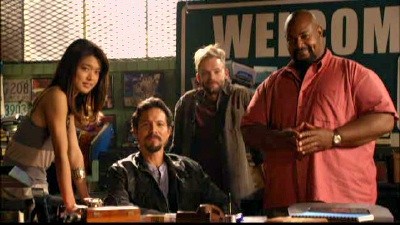
|
| Popular Reviews |
| Sponsored Links |
|
|
| Sponsored Links |
|
|
| Release List | Reviews | Shop | Newsletter | Forum | DVD Giveaways | Blu-Ray | Advertise |
|
Copyright 2024 DVDTalk.com All Rights Reserved. Legal Info, Privacy Policy, Terms of Use,
Manage Preferences,
Your Privacy Choices | |||||||









